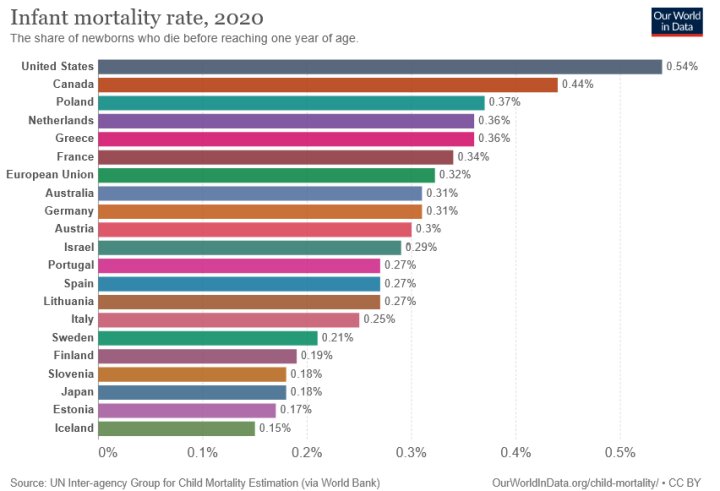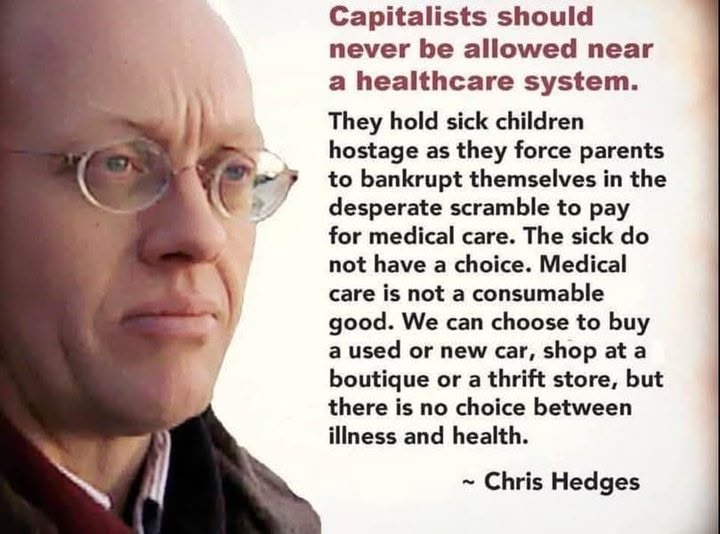America spends too much on healthcare ($5 trillion annually). So the solution is . . . to put the government in charge of everything???
Photo above - would this guy have shot the head of the Veterans Administration if he blamed his chronic back pain on THEIR policies?
Americans (as a nation) spend the most on healthcare, die sooner, and are sicker when we die (see link below). Yeah . . . been hearing that for more than a decade now. Since before Obamacare, actually. A program which was supposed to increase lifespans, cut costs, and insure everyone for everything. (insert sound of crickets chirping).
And now the US spends $5 trillion annually ($13,000 per man, woman, child, and non-binary). Double the amount spent by countries like Australia, Canada, and the UK.
So, we MIGHT be able to save money on healthcare by putting 200,000 federal bureaucrats in charge. That’s about how many collectively work at the FDA (Food and Drug Administration); HHS (Health and Human Services; Medicare, Medicaid, and the VA healthcare programs. And the ARHQ, ATSDR, CFSAN, CNPP, CDC, CMS, DHA, FNS, FSIS . .
Yeah, there are dozens and dozens of agencies. No, I’m not going to spell out all the acronyms here. Use Google if you’re skeptical.
But still, it MIGHT (theoretically) be possible for Americans to live longer, healthier, and less expensive lives, if we put politicians and bureaucrats in charge. And if those brainiacs might do not repeat any of the awful policies in effect at the VA, Medicare, Medicaid, Pentagon, Public Schools, and whoever is in charge of fixing our 41,000 unsafe/collapsing bridges.
This might possibly work. But I’m still skeptical.
I know how Britain and Canada make it work (I’ve been to both countries, but not Australia). They pay doctors and nurses a pittance – which is why so many of their medical professionals aspire to migrate to the USA.
Also, if you live in Britain, you can’t have elective surgery whenever you want. You can get on a waiting list and then cross your fingers. Things like hernia repair. Bunion surgery. Joint replacement. Chronic back pain. Tonsillectomies. Kidney stones. The NHS WILL do something about your appendicitis, but only after watching it fester for weeks and hoping for the best until it takes a turn for the worse.
This is, in fact, how America’s own veterans' administration health care operates. And a contributing factor for why so many vets have untreated PSTD, substance abuse, mental health issues, etc. They’re on some waiting list.
I do want the extra 19 months of life expectancy Brits enjoy. But to achieve that we’d probably have to allow the government to take charge of even MORE (non-healthcare) stuff. Transition us to fewer cars and shorter trips. Re-criminalize narcotics. Use Britain’s weird method of defining live birth or not. Criminalize gun possession (full disclosure – I believe guns should be licensed and insured like automobiles). Restrict the use of ski-doos and personal watercraft. Stop alcohol consumption on college campuses. Arrest and jail all those streetcorner Fentanyl impresarios.
Simply paying American doctors less, and pivoting to Veterans Administration style treatment policies probably won’t get us there. And creating a panic about vaccinations won’t either, Mr. Kennedy. Your dad is probably rolling over in his grave.
I’m just sayin’ . . .
‘The US is failing’: Shocking study of 10 wealthy nations reveals Americans die the youngest, ‘live the sickest lives’ — despite the US spending the most on health care. Here’s the problem
List of countries by total health expenditure per capita - Wikipedia























